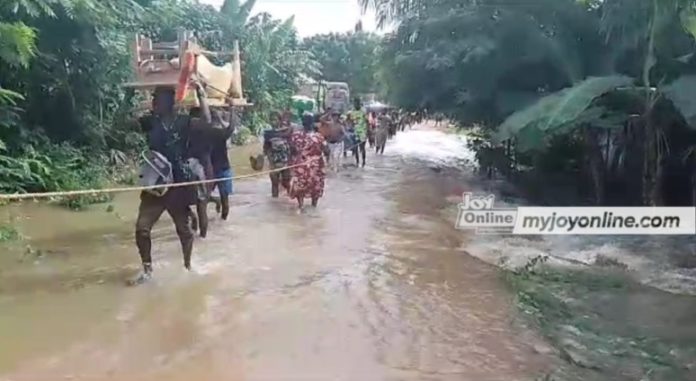The Volta River Authority (VRA) has blamed the Ghana Meteorological Service for the devastation the spillage of the Akosombo dam has caused.
According to VRA, the Ghana Meteo misled them with its prediction of the rainfall and drought pattern for the year.
The VRA Public Relations Officer (PRO), Samuel Fletcher, disclosed this on Adom TV’s Nnaw)twe Yi.
“The forecast was that we may not get water this year, so we had to protect ourselves so we could produce electricity, but around July, we realised the situation was different, and that is the work of God no man can stop.
“The excess water is not as a result of rains in Accra or Koforidua that come into the dam. But it is those from about six areas, including Mali, the North, and Burkina Faso, and once there is excess water, we need to spill,” he said.
However, the PRO for Ghana Meteo, Joshua Asamoah, also on Adom FM Midday News, disputed the claims.
Mr Asamoah explained that, they work closely with VRA, NADMO and the Geological Service and all these stakeholders provided adequate updates on the seasonal forecasting.
The claim of Mr Fletcher, he indicated was one which is hard for him to accept, stating he doesn’t know where he got that information from.
“No matter how the information is communicated, the interpretation sometimes becomes a challenge,” he said.
The blame game comes in the wake of millions of properties lost in parts of the Volta region following the spillage of the Akosombo dam.
Flooding caused by the spillage has forced many communities in the North, South, and Central Tongu districts of the Volta Region to evacuate, leaving them with no choice but to try and salvage what’s left of their belongings.
On Friday, former President John Mahama visited parts of Sogakope and Sokpoe to assess the impact of the spillage and to meet with affected communities and families.
He has called on VRA to hasten efforts to support affected residents.
Meanwhile, the government has also set-up a 13-member committee chaired by the Chief of Staff Frema Akosua Osei Opare to coordinate responses to address the situation.
ALSO READ:
Listen to the interview in the audio above:

